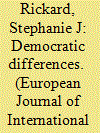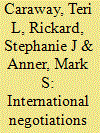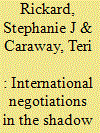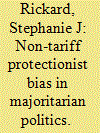| Srl | Item |
| 1 |
ID:
101387


|
|
|
|
|
| Publication |
2010.
|
| Summary/Abstract |
A growing body of literature argues that democracies are more likely to comply with international agreements than authoritarian states. However, substantial variation exists in the compliance behaviour of democracies. How can this variation be explained? The same mechanism that links regime type to compliance, namely electoral competition, also explains variation in compliance among democracies. This is because the nature of electoral competition varies across democratic systems. An analysis of democratic GATT/WTO member countries from 1980 to 2003 reveals that governments elected via majoritarian electoral rules and/or single-member districts are more likely to violate GATT/WTO agreements than those elected via proportional electoral rules and/or multi-member districts.
|
|
|
|
|
|
|
|
|
|
|
|
|
|
|
|
| 2 |
ID:
112131


|
|
|
|
|
| Publication |
2012.
|
| Summary/Abstract |
What is the role of international organizations (IOs) in the formulation of domestic policy, and how much influence do citizens have in countries' negotiations with IOs? We examine these questions through a study of labor-related conditionality in International Monetary Fund (IMF) loans. Using new data from IMF loan documents for programs from 1980 to 2000, we test to see if citizens' economic interests influence IMF conditionality. We examine the substance of loan conditions and identify those that require liberalization in the country's domestic labor market or that have direct effects on employment, wages, and social benefits. We find evidence that democratic countries with stronger domestic labor receive less intrusive labor-related conditions in their IMF loan programs. We argue that governments concerned about workers' opposition to labor-related loan conditions negotiate with the IMF to minimize labor conditionality. We find that the IMF is responsive to domestic politics and citizens' interests.
|
|
|
|
|
|
|
|
|
|
|
|
|
|
|
|
| 3 |
ID:
133278


|
|
|
|
|
| Publication |
2014.
|
| Summary/Abstract |
This study examines the role elections play in negotiations between states and the International Monetary Fund (IMF). Although loans made by the IMF often require countries to introduce painful austerity measures that provoke a backlash from angry citizens, some governments are able to negotiate more favorable terms than others. Original data on the substantive content of IMF loans show that governments leverage imminent elections to obtain more lenient loan terms. Conditions that require labor market reforms in exchange for IMF financing are relatively less stringent in loans negotiated within six months before a pending democratic election, all else equal. The further away elections are from loan negotiations, the more stringent the labor conditions included in countries' loan programs. Elections give governments leverage in their international negotiations and this leverage is effective even when states negotiate with unelected bureaucrats during times of economic crisis.
|
|
|
|
|
|
|
|
|
|
|
|
|
|
|
|
| 4 |
ID:
118177


|
|
|
|
|
| Publication |
2012.
|
| Summary/Abstract |
Governments elected by majoritarian rules are, according to conventional wisdom, more protectionist than governments elected by proportional rules. However, existing tests of this claim examine only one possible form of trade protection: tariffs. This leaves open the possibility that governments in majoritarian systems provide no more protection than governments in proportional systems but simply use tariffs more often than other forms of trade protection. Does the protectionist bias in majoritarian politics extend beyond tariffs? The current study addresses this question by examining an increasingly important form of trade protection: subsidies. In a sample of 68 countries from 1990 to 2006, spending on subsidies is found to be higher in majoritarian systems than in proportional systems, holding all else equal. The implication is that the protectionist bias in majoritarian systems does in fact extend beyond tariffs.
|
|
|
|
|
|
|
|
|
|
|
|
|
|
|
|